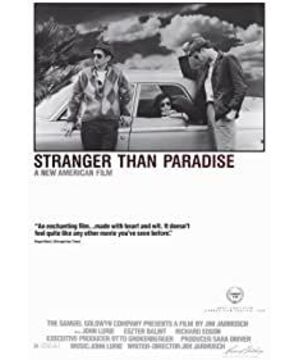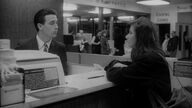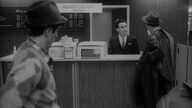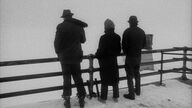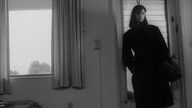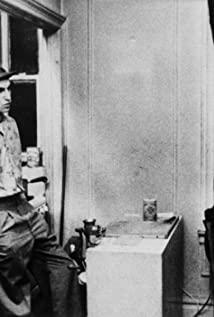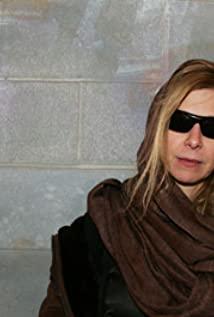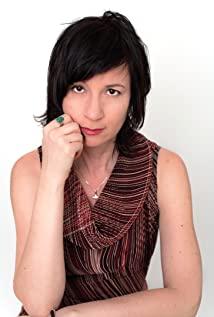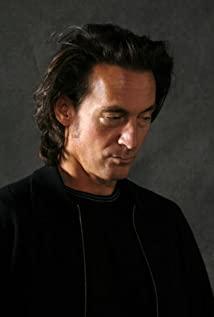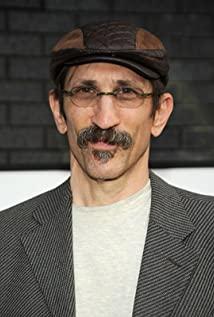As one of the leading figures in the new generation of independent films in the United States, Jia Muxu has become more and more popular. After watching several of his works, I found that his second feature film "Paradise Mo Ying" is always on my top 10. On the list. This film, which made its stunning debut in Cannes in 1984, won Jamush the Golden Camera Award to commend the new director. Since then, Jamush has been a young filmmaker who dropped out of the Film Department of New York University and set foot on the road. The path of an internationally renowned independent director.
What kind of movie is "Paradise Movie"?
The coarse-grained black-and-white film pictures, the simple dialogues, which blur the background of the city and young people, the cold and deserted landscape, and the long still shots one after another. At the end, they are in the minimalism and nihilism. A hint of humor and warmth was found under the mask.
The narrative of "Paradise" is poetic in prose, and the plot is very simple: Willie is a New York City hipster, and like his good buddy Eddie, both of them are vagrant. Despite his Hungarian ancestry, Willie thinks he is 100% American. One day, his distant cousin from Hungary, Eva, came to New York from Budapest, preparing to gain a foothold in the United States. She stayed at the reluctant Willie’s house for ten days. During a short stay, Eva also became friends with Willie and Eddie. A year later, Willie and Eddie, who won a sum of money by playing cards, drove a borrowed car on the road and went to Cleveland to reunite with Eva. After meeting, the three young people who were tired of the bad weather and the unchanging life decided to go to Florida together, even though they ended up staying idly at a cheap motel that said "Welcome to Florida" on the wall. . Willie and Eddie went to bet on horses, and Eva ran out to relax, only to gain a fortune halfway through. She left a note saying that she had decided to go back to Budapest, but at the last minute she changed her mind and hurried back to the hotel room to find the two boys, and found that they had rushed to the airport...Finally, the three people found themselves in a rivalry. When he came, he was even more disoriented. Eddie looked at the take-off plane and muttered to himself with his mouth drooping: Willie, what are you doing in Budapest?
It sounds a bit ups and downs, but in fact "Paradise Mo Ying" is more like a "nothing happened" movie. In 89 minutes, three characters repeat daily and monotonous things: watching TV and smoking cigarettes. , Driving, playing cards, swinging around...
In Jamush’s own words, the original intention of this film is to oppose “overly dramatic scenes” (a radical resistense to “overly dramatic scenes”). It is not so much about telling a blundering story as it is. It is depicting a state of nothingness and loneliness.
Black and white film creates an atmosphere of desolation and alienation. For this reason, Jiamuxu also deliberately reduces the use of lines and soundtracks. Therefore, "End of Paradise" is silent, and the rich sounds in the film (dialogue, music, monologue, etc.) are usually not Absent, but in a period of flowing or static silence, the absurdity of individual existence, mutual relationship, and individual and external relationship is magnified, fixed, and examined, and finally constructs the core theme of the whole film : The loss of self-identity, the alienation of the individual and the loneliness in the modern world.
The opening shot of "Heavenly Shadows" is a quiet and desolate scene. Somewhere on the bare tarmac, the girl Eva turned her back to the camera and was wearing a long black coat. The only sound in the screen was the roar of the engine of an airplane in the distance. Then Eva turned around, picked up the suitcase, with a cold expression on the young face, walked straight out of the camera, but the camera continued to stop there, and we were "forced" to look at the gray empty mirror for more than ten seconds. Then, after the iconic black screen transition of the film, there is another long shot, following the cold-faced girl walking down the sparsely crowded and messy streets of New York. In the lens of Jamusch, the black-and-white New York in the 1980s is not as charming as other movies. It looks like any backward and unpopular small city.
Another iconic technique of the film is also ready to emerge at this moment, that is, one shot to the end between each black screen transition. A long shot is a scene, which divides the prose culture's "Paradise in Paradise" into 67 pieces. Fragment of the mirror to the end. Jamush and Wenders met in the early 1980s. The two first collaborated on Wenders’s 1982 film "The State of Things." At that time, Jamus was in charge of the soundtrack, and Wenders made the rest of the film. The film was given to Jamusch, and there was a film-saving, almost no-editing "Paradise Shadow". At Cannes in 1984, the two met again. Wenders, who had been in the United States for many years, relied on "Texas "Paris" (also my personal top ten) won Palme d'Or, which can be described as a joy to everyone.
In Cleveland, Willie and Eddie once again met Eva, who lives at his aunt’s house and works in a hot dog shop. Three young people who are still doing nothing decide to see Lake Erie. In the raging snow, they leaned on the railing and shrank themselves. In the thick coat, there was a pair of talks, until Eva suddenly said, "It's a drag here, really" (It's a drag here, really), followed by a half-minute silence, a Jamush style Fixed long lens. It’s hard for me not to imagine what these three young people who are in a divorce from the current situation are thinking, but Jia Muxu does not intend to give us any answers, only through the static and silent long shots one after another, for the viewer. Provide a perceptual approach.
From beginning to end, we watched these three dazed young people, from New York to Cleveland, from Cleveland to Florida, feeling sleepy and lost everywhere, unable to escape the loneliness net. They stare at the void, and we stare at them, and the language of Jamusch makes this gaze part of the movie.
In "The Shadow of Paradise", Jamusch keeps his three characters in a kind of aimless wandering, both physically and spiritually. As a new immigrant, Eva "roams" in an unfamiliar American society, uncomfortable with the status quo and nowhere to go; Willie and Eddie, two prodigal sons who are not doing business, seem to have no idea what to do next after making money. Start road trip casually, indifferent to the industrial landscape roaring past the car windows and the vast lake covered by ice and snow.
Finally they found out, "Do you know? What's interesting is that I thought I went to a new place, and everything seemed to be the same as the original place."
View more about Stranger Than Paradise reviews


